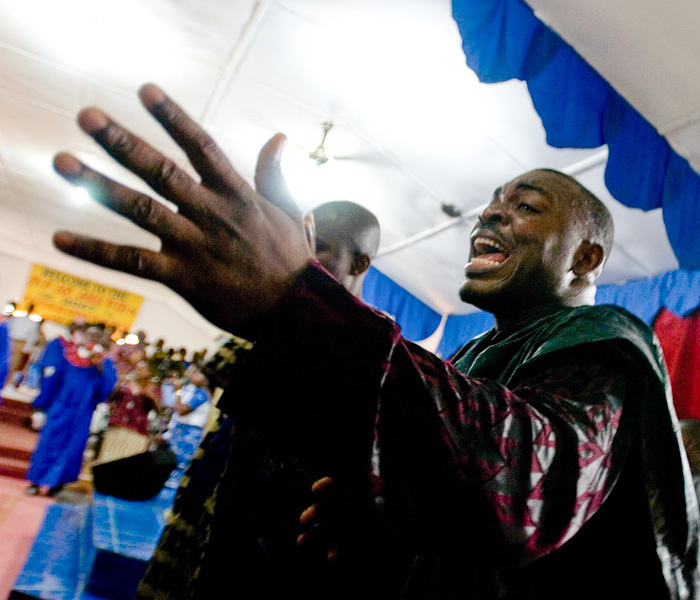What if a monster doesn’t die?
Moreover, what if a monster claims to have changed, to be truly repentant, and seeks to make amends with the people he’s hurt? After the unforgivable, is forgiveness possible? And even if it is, is it really a good thing for society to do so?
Well, I’m not wise enough to answer those questions, and even less certain of my answers after watching the infuriatingly perplexing new documentary “The Redemption of General Butt Naked,” showing at 7:30 tonight at Space Gallery in Portland.
We first meet Joshua Milton Blahyi brushing his teeth in a hotel room, getting dressed in a natty white suit while singing a hymn and then preaching to a small congregation in a low-ceilinged, sweltering church hall.
He’s a powerfully built man with a scarred face and undeniable charisma, exhorting his audience to praise Jesus and raise themselves up via the church. An unremarkable scene, an ordinary man.
Except that, during Liberia’s unfathomably bloody 14-year civil war — which is thought to have claimed more than 250,000 lives — Blahyi was known as General Butt Naked, the most feared and ruthless warlord in the country, with a demon’s resume. Recruiting young boys to his army (partly by showing them Jean Claude Van Damme films to convince them war was just a game), he led ruthless attacks on unarmed villages, slaughtering, maiming and raping as he saw fit.
Armed with a machete and leading his army into battle wearing nothing but leather shoes (hence the deceptively silly name), Blahyi was personally responsible, according to his own testimony, for at least 20,000 deaths.
And now he says he’s reformed. A man of God.
Filmmakers Daniele Anastasion and Eric Strauss take a journalistically dispassionate approach to their subject as Blahyi seeks out his (living) victims and seeks their forgiveness.
In one wrenching scene, he is led to a weeping woman and says abruptly, “I’m sorry I killed your brother … forgive me,” as she averts her eyes and he stands by, awaiting a response that never comes. In another, Blahyi voluntarily appears before Liberia’s Truth and Reconciliation Commission and confesses to those 20,000 deaths. (He’s the only high-ranking warlord to do so.)
What is in the man’s mind as he stands there? Does he really expect forgiveness? Is his conversion genuine? And should it matter?
The film lets skeptics state their views. Some flat out say Blahyi’s faking it, hoping to use his alleged reformation to evade potential war crimes prosecution. One activist makes the point that “joining a particular religion is not sufficient and will not replace justice.” And, as the film tracks Blahyi’s years-long journey, his actions keep a definitive view of the man maddeningly elusive.
So what to make of a man like Blahyi? The film leaves that question, and the question of what a society should do with someone like him, to us. The film and the questions it raises are frustrating, fascinating and deeply upsetting.
“The Redemption of General Butt Naked” will be followed by a discussion with Libby Hoffman, founder of West Africa’s community owned reconciliation program, Fambul Tok.
Dennis Perkins is a Portland freelance writer.
Send questions/comments to the editors.



Success. Please wait for the page to reload. If the page does not reload within 5 seconds, please refresh the page.
Enter your email and password to access comments.
Hi, to comment on stories you must . This profile is in addition to your subscription and website login.
Already have a commenting profile? .
Invalid username/password.
Please check your email to confirm and complete your registration.
Only subscribers are eligible to post comments. Please subscribe or login first for digital access. Here’s why.
Use the form below to reset your password. When you've submitted your account email, we will send an email with a reset code.